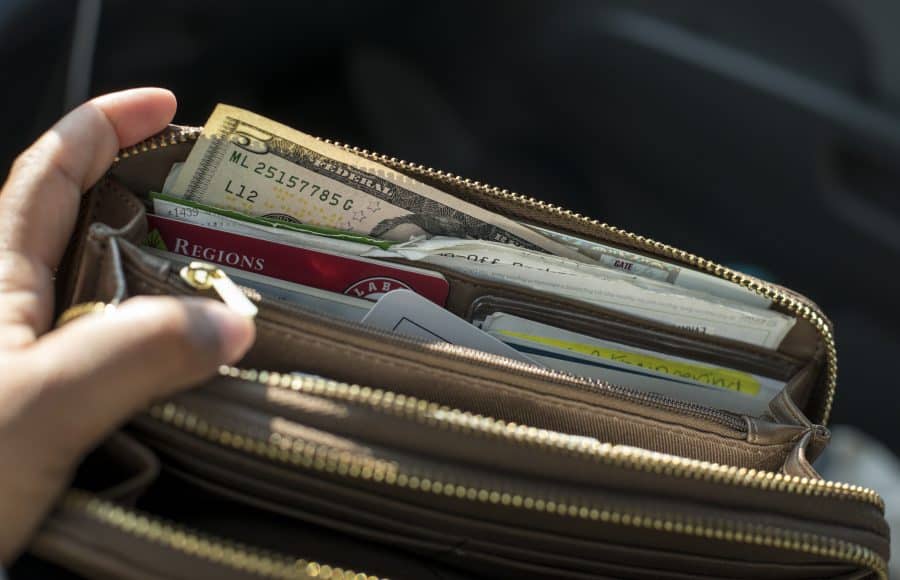For Mary Buzbee, financial stress has become normalized. Estranged from her parents, she has been financially independent for a long time. Buzbee has had to pay her way through college through means such as student loans. They cause her some stress, but it is stress that she feels is worth it.
“It was either take out student loans and see what you can get in Pell Grants and go to school,” Buzbee said, “Or just don’t go to school. And I definitely knew I wanted to go to school. So that was a major driving force.”
Student loans is a phrase that is closely associated with college, usually producing the image of paying fees years after finishing college. When Buzbee, a senior advertising major, graduates, she will have $35,000-$40,000 in student loans to pay off, and she’s not alone.
“One of the things that I’ve found with the rising cost of education is that it’s really a situation where students have to take out some type of student loan,” said Victoria Javine, professor of economics, finance and legal studies at The University of Alabama.
Javine feels there is not enough federal grant aid, which puts the majority of students in a position where they have some type of loan debt upon leaving school.
Commonly, the first piece of advice that many students hear before they plan to take out student loans is to fill out a FAFSA or Free Application for Federal Student Aid form. Federal Student Aid, where FAFSA comes from, is a division of the United States Department of Education.
In the state of Alabama, the average level of student loan debt at the undergraduate level is around $30,000. That is the same as the current national average, which is up from a national average of $25,000 in 2012.
Javine said that there are two main groups of loans that students need to be aware of.
“You have your public loans that are direct,” Javine said. “Then you have your private loans and with those loans, the rates are likely to be variable rate loans. The terms are not likely to be as favorable.”
Buzbee has had to take out public and private loans, and understands this well. She said that private loans tend to have much higher interest rates.
“Really be careful about looking at interest rates and seeing when loans accrue interest,” Buzbee said. “….Only take [private loans] out if you really, really need them.”
There are steps that Javine recommends that students who are planning to take out loans should take. Financial advisors are available on campus for students when they have money related questions.
“Read through the terms of those loans and get a deep understanding of what the payment structure might be, the interest rates and limits to types of loans they can take,” Javine said. “Exploring other options like making sure they apply to scholarships and grant aid and reaching out to financial aid counselors before actually signing on is important.”
Once she graduates, Buzbee plans to get started on an income-based repayment plan. She feels paying back the loans based on how much she makes each month is her best option, though there is something she wishes she had done more of before taking out loans.
“One thing I do wish I did more of was looking for specific scholarships because there are so many scholarships out there,” Buzbee said. “[I think] doing the work to research and apply for as many as I could have would have changed obviously how many student loans I have.”
Javine said that the research shows that students aren’t amassing student loan debt because they don’t understand the impact of loans, but rather because they understand the importantce of paying for college.
“We understand that if you get higher education, that can translate into higher income,” Javine said. “But if you come from a situation where your family can’t afford to pay out of pocket, then your next best option is student loans.”
Gregory Givens, an associate professor of economics, finance and legal studies at the University, noted that there are both risks and possible benefits to paying for higher education, as well as taking out student loans. He said that people who attend institutions of higher education are employed faster and paid better than those who do not.
“While college is expensive, it is a wise investment,” Givens said.
For Buzbee, while the knowledge of her impending debt can be stressful at times, she knows the investment is worth it.
“I just ride with it because I know that going to school and taking out these loans is so so so worth it,” Buzbee said. “I knew that I wanted to go to school to find a job that I would really enjoy.”
While she will be paying back different entities for a while, Buzbee understands that no matter how much money different institutions take from her, there is one thing they cannot take.
“No one can take away your education.”









